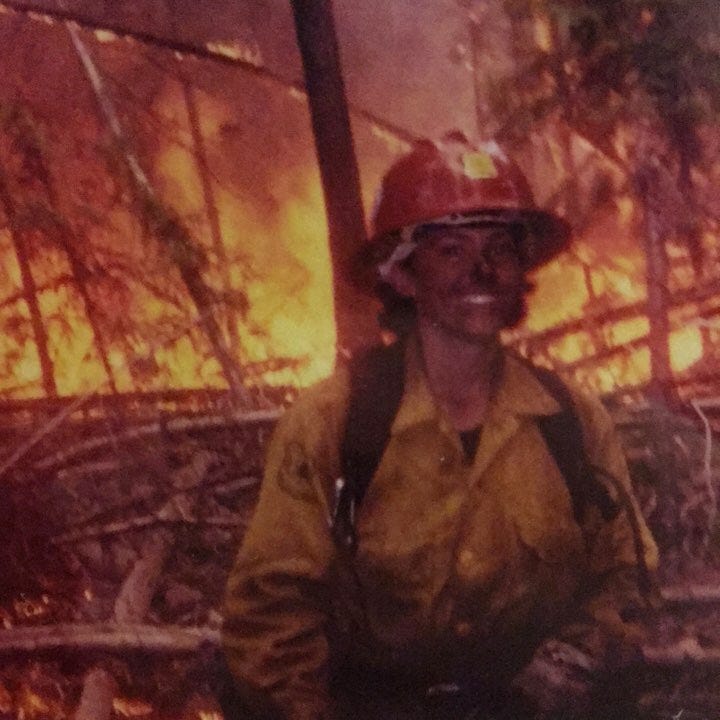Welcome to WILDERNESS.
WILDERNESS is a newsletter about colonization, wildfires, ecology, culture, and current events, written by River Selby, a former hotshot and wildland firefighter. From long form series, to interviews with ecologists, firefighters, and Indigenous fire experts, to deep dives (with citations) and news bits, WILDERNESS is here to educate its readers with writing that’s engaging and informative.
WILDERNESS is here to help deconstruct the constructed conceptions of wilderness and “untouched lands” that have led us to this moment in history.
A Nuanced, Experienced Perspective
My first year as a hotshot wildland firefighter was in 2002 (I’d already worked two fire seasons before that). I was the only person on my crew who wasn’t a man. The crew I worked on was steeped in macho, fragile masculinity (a phrase I wish I’d known then). Much of wildland firefighting and the fire suppression industrial complex still exists in that toxic framework, and fire suppression itself was founded on a framework that deemed Indigenous people savages and overlooked sophisticated, kin-centric ways of tending the land. The effects of this have been and continue to be catastrophic.
Our planet, forests, and people need something different. But how can we change if we don’t know the possibilities?
The history and science of wildland fire, and the concept of wilderness and nature as a whole, is complex and nuanced. We are constantly inundated with news about the planet’s decline, climate change, and catastrophic natural events like wildfires.
Wildfires, unlike other natural disasters, are perceived as preventable. Since the arrival of Europeans, fire has been perceived as disastrous and destructive, and nature itself perceived as separate from “civilized” humans, meant to be dominated and controlled for our benefit.
Many people have endured trauma and tragedy as catastrophic wildfires razed their communities. Reportage is focused on this tragedy, ballooning the specter of wildfire and increasing public outcries for suppression.
But we’ve been suppressing fires for over a century. Is that really the answer here? And is climate change the only driver of these fires?
No, and no.
Did you know that Indigenous people throughout the world have used fire as an ecological and cultural tool for thousands of years? Or that many landscapes and ecosystems throughout the United States (and the world) are especially adapted to fire, and thrive when fire is consistently present?
Many (not all!) people reporting on fire are not only undereducated about wildland fire as a cultural, ecological, and historical phenomenon— they haven’t seen fires up close. As a former hotshot with nearly a decade of experience working in wildland fire, I’ve spent years of my life intimately and inextricably connected to fire. Years of my life covered in soot, dirt, ash, and grime; with my skin flushed from the heat of nearby fires. My writing is informed by these years, and by my education in fire ecology, history, and colonization.
I report on fire and fire history from a marginalized perspective, and prioritize perspectives more marginalized than my own. While most narratives surrounding wildland fire are written by white men, some of the most important narratives are those of Indigenous Americans and women. I seek to prioritize these perspectives.
With your help, I can provide in-depth histories, highlight important voices of wildland fire and ecology, and bring something new to your inbox on a weekly basis. Through reading this newsletter you’ll not only understand more about wildland fire, but about the United States and the world, ecology, and history.
By becoming a paying subscriber, you support my writing and this mission. Thank you so much for your support.
Who am I?
In 2000, I began working as a wildland firefighter on a contract crew out of Eugene, Oregon. For two summers I roamed the west on crews and engines contracted out by the government. Then, in 2002, I was hired onto an elite firefighting crew in California, called a hotshot crew. I was the only person who wasn’t a man, the first femme they’d had on the crew in years. It was a shock, but I loved the work. On our first roll I got poison oak all over my body, which would become a common theme of fighting fire in Southern California. I was hired as a permanent and trained to be a squad boss, but left because of harassment on the tail end of my second year, which was heartbreaking for me.
I worked as a hotshot for four years, in California and Colorado. I also worked for the Park Service in Alaska as a helicopter crew member.
I gained a lot of perspectives by working in many different geographical areas, but I didn’t start writing about my experiences until I went back to school at 32 years-old. I graduated with my BA in English at 35 years-old, and with my MFA in creative writing (fiction) from Syracuse University at 38 years-old. I am the first person in my family to graduate high-school, and the first ever to go to a four year institution.
I come from a working-class background and was raised by a single mom. This is one of the lenses through which I see wildland fire and ecology. I am also queer and nonbinary, always looking for angles outside the mainstream, and always looking for innovative solutions. My hope is to bring new perspectives and ideas to my readers, and to create an inclusive community.
Currently, I am a PhD candidate in English at Florida State University, where I study English with a focus on Nonfiction and eco-criticism.




